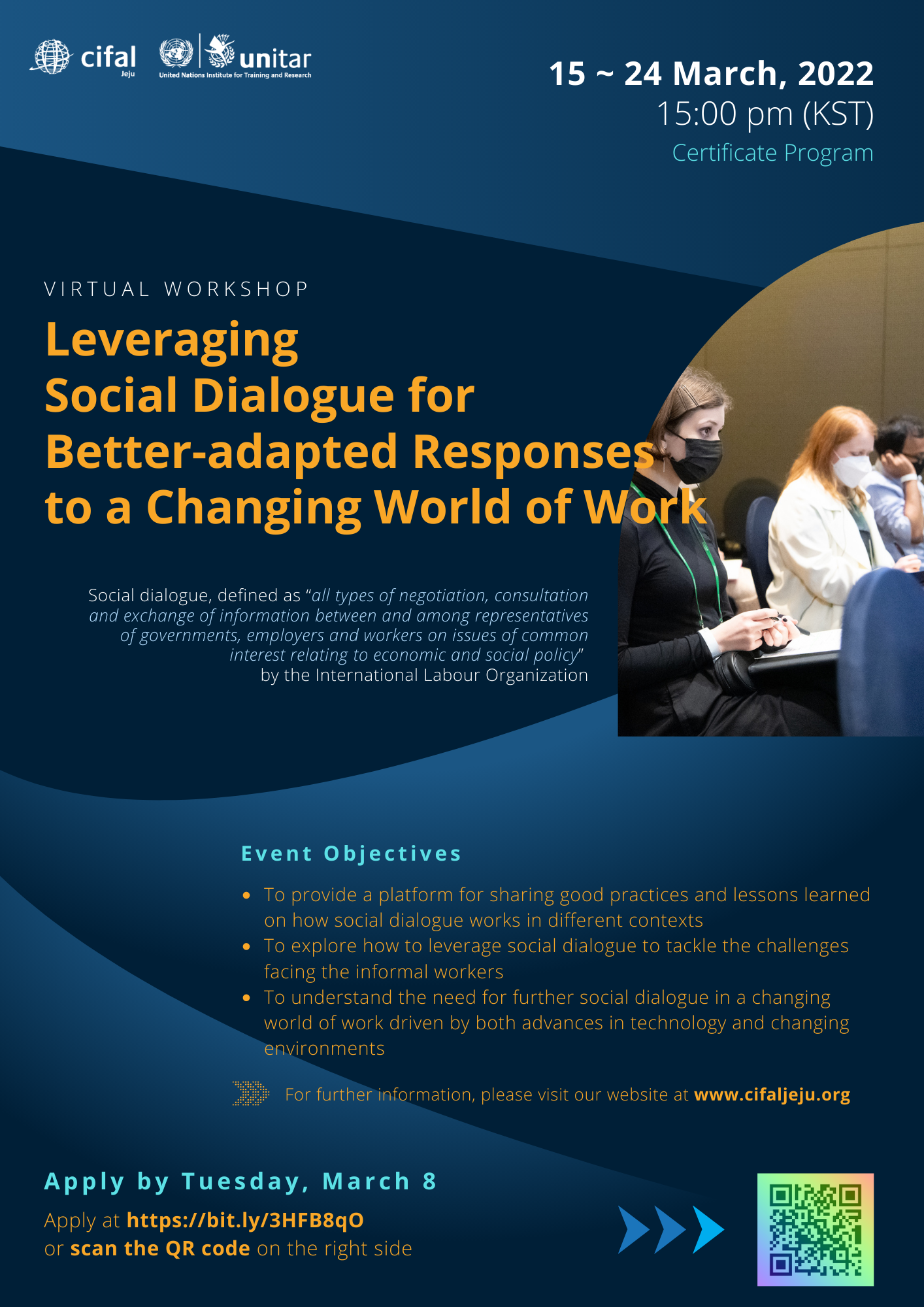CIFAL Jeju/JITC provides a variety of training programs to enhance capacity for national and local communities in the Asia-Pacific region to benefit from holistic and multi-disciplinary approaches available in such diverse areas as human trafficking, migration and refugees, urban poor, resilience and disaster risk reduction, making peaceful and inclusive societies, and so on.

 2022.04.20
2022.04.20
|
Leveraging Social Dialogue for Better-adapted Responses
to a Changing World of Work
15 ~ 24 March 2022 at 15:00 pm (KST)
Background
The international community has been grappling with the lingering effects of the COVID-19 pandemic for more than two years, and yet the effort to Leave No One Behind and reduce existing inequalities is far from enough. The virus has taken a toll on the lives of the poor in general, not to mention those of vulnerable workers in the informal sector. A multitude of documents released by international organizations and research institutes such as World Bank, OECD, ILO, ODI, etc., inarguably indicate that the pandemic has hit the world’s poorest and vulnerable groups extremely hard, resulting in large setbacks in poverty reduction.[1]
Emerging variants of the virus in recent months and their spread in low-income countries with poor vaccine supply can cause the long-term health crisis, which in turn will lead to massive economic and social disruption. Considering work in the informal economy still accounting for more than 60% of the world’s employed population[2] and the impacts of the pandemic on the informal sector with poor social protection programs, together with the rapidly changing world of work, governments and their social partners need to take comprehensive measures covering all areas – health, social and economic – to overcome the current crisis while designing effective strategies to reduce the prevailing inequalities and protecting the most vulnerable. In this regard, Social dialogue can play a crucial part in mitigating the initial negative shocks caused by the pandemic and preventing the shocks from turning into a further deeper and long-lasting downturn. By involving stakeholders, the process of social dialogue makes it possible to take into consideration different concerns and perspectives and to reach balanced solutions based on the mutual respect and trust built through the process.[3]
The International Labour Organization defines social dialogue as “all types of negotiation, consultation and exchange of information between and among representatives of governments, employers and workers on issues of common interest relating to economic and social policy”. Social dialogue can play an integral part in establishing sound governance for tackling such a complex crisis for the following reasons: first, through information-sharing between stakeholders – governments, employers’ and workers’ organizations, better policy design for crisis response and recovery can be made; second, social dialogue strengthens ownership and commitment to the policy, leading to the way for the rapid and more effective implementation; and lastly, it helps build the trust that is required for social cohesion and resilience as countries strive to rebuild the blocks of their economy and societies over a longer period of time.[4]
With these vital roles that social dialogue can play in mind, CIFAL Jeju organizes a virtual capacity building workshop to provide space for knowledge sharing and peer learning experiences along with expert insights on social dialogue for better-adapted responses to a complex crisis in different contexts. The program will explore the role of social dialogue in the context of social protection responses to such crisis as the pandemic, how social dialogue can contribute to promoting lifelong learning and skills development and how it can work from the perspective of informal workers. Also, the program will take stock of the need for further social dialogue in a changing world of work driven by technological advances, demographic shifts and climate change.
Event objectives
To provide a platform for sharing good practices and lessons learned on how social dialogue works in different contexts
To explore how to leverage social dialogue to tackle the challenges facing the informal workers
To understand the need for further social dialogue in a changing world of work driven by both advances in technology and changing environments
Expected outcomes
Better understanding of what social dialogue can bring about for the 2030 Agenda
Sharing different experiences in social dialogue engagement among different stakeholders
Getting familiarized with how to leverage social dialogue for better-adapted responses to a changing world of work
Target audience
This training is mainly open to those from different sectors in the Asia Pacific region – governments, NGOs, CSOs and Private Sectors, who have been working in the social development area.
Methodology
The training consists of:
- expert lecture and discussion
- group discussion and group presentation
- individual assignment
* All the sessions will be delivered using the Zoom platform.
Program Structure
*Please see the agenda for the program details.
Deadline for application - Please apply by March 8, 2021 (Tuesday)through the following link https://bit.ly/3HFB8qO.
*Kindly note that only selected participants will be notified individually along with the guidelines for the program.
Organizer
UNITAR CIFAL Jeju/Jeju International Training Center
Certificate
A Certificate of Completion will be awarded to those who have completed two thirds of the program and fulfilled the required tasks – e.g. group activity, submission of individual assignment. A certificate will be jointly issued by UNITAR and UNITAR CIFAL Jeju. |







